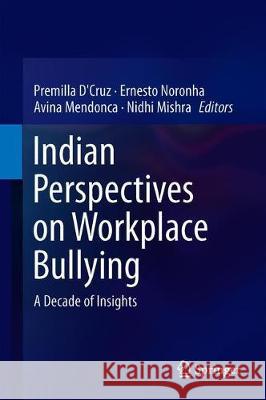Indian Perspectives on Workplace Bullying: A Decade of Insights » książka



Indian Perspectives on Workplace Bullying: A Decade of Insights
ISBN-13: 9789811310164 / Angielski / Twarda / 2018 / 263 str.
Indian Perspectives on Workplace Bullying: A Decade of Insights
ISBN-13: 9789811310164 / Angielski / Twarda / 2018 / 263 str.
(netto: 383,36 VAT: 5%)
Najniższa cena z 30 dni: 385,52
ok. 16-18 dni roboczych.
Darmowa dostawa!
Premilla D’Cruz holds a PhD in Social Sciences from the Tata Institute of Social Sciences, Mumbai, India. She is currently Professor of Organizational Behaviour at the Indian Institute of Management Ahmedabad, India. Together with Ernesto Noronha, Premilla has been researching the area of workplace bullying for over a decade and has covered various facets of the phenomenon through pioneering work which has extended the boundaries of our understanding. In addition to two books on workplace bullying, Premilla has published numerous papers in reputed peer-reviewed journals and made several international presentations on the topic. Premilla, along with Ernesto Noronha, is Chief Editor of Handbooks of Workplace Bullying, Emotional Abuse and Harassment, Volumes 1-4 (Springer). Premilla’s other research interests include emotions at work, self and identity, organizational control, and information and communication technologies (ICTs) and organizations. Premilla has been a visiting scholar at various European and Australian universities and has received multi-lateral and bi-lateral study grants and research awards. She has served as the President (2016-2018), Secretary (2010-2016) and Special Interest Groups Coordinator (2008-2010) of the International Association on Workplace Bullying and Harassment (IAWBH).
Avina Mendonca is Assistant Professor of Organizational Behaviour at the Indian Institute of Management Nagpur, India. A Fellow in Organizational Behaviour from the Indian Institute of Management Ahmedabad, India, her doctoral dissertation explored employees’ lived experiences of beauty service work as dirty work. Before pursuing her doctoral studies, Avina worked as a lecturer of Organizational Behaviour at Vivekananda College of Engineering and Technology, Puttur, India. Avina’s research interests include customer abuse, dirty work, identity, resistance, service work and workplace bullying. She has co-authored a chapter on flow among academicians in the collection New Ways of Studying Emotions in Organizations (2015, Emerald). Her article on bad apple behaviour in groups and teams (2017, co-authored with Saravana Jaikumar) has appeared in Team Performance Management: An International Journal.
Nidhi Mishra is a doctoral scholar in Organizational Behaviour at the Indian Institute of Management Ahmedabad, India. Her current research, anchored in postpositivism and located in India’s IT/ITES-BPO sector, aims at understanding targets’ subjective experiences of the forgiveness response to workplace bullying. Her research interests include workplace forgiveness, workplace bullying, coping, emotions and power. Nidhi has co-authored a book chapter titled "Understanding Flow among Academicians" published in 2015 by Emerald, in addition to providing teaching assistance for the course ‘Socio-Political Contexts for Research in Management’ at the Indian Institute of Management Ahmedabad. She has presented papers at national and international conferences. Prior to pursuing her doctoral studies, Nidhi worked as a software engineer for 3 years at Accenture Services Private Limited, Mumbai, India.
This book, recognizing that workplace bullying is a significant employment relations and occupational health and safety problem in India which warrants urgent and holistic intervention, presents empirical studies examining contextual factors, antecedents, mediators, moderators, processes, outcomes and solutions, thereby deepening our understanding of the phenomenon. The chapters showcased in the volume emphasize the paradoxical Indian sociocultural ethos whose simultaneous embrace of humanism versus identity-based, personalized and hierarchical relationships, materialism versus spiritualism and individualism versus collectivism both fuel yet quell misbehaviour. The inquiries which constitute this book engage both positivist and postpostivist paradigms, draw on several theoretical and substantive frameworks, utilize an array of methods, investigate numerous foci and cover various geographical regions in India, a range of industrial sectors and all levels of the organization. In so doing, they make pathbreaking contributions beyond country-specific insights to advance the frontiers of the thematic area worldwide. The chapters include important findings pertaining to digital workplaces, child labour, forgiveness, customer bullying, psychological contract violation, perceived organizational support, psychological capital and comprehensive prevention strategies encompassing psychosocial risks. As well as building on a decade of knowledge about workplace bullying in India, the book puts forward a research agenda on the topic for the subcontinent in particular and the field in general. The volume is of interest to researchers, practitioners and students of organizational studies, human resource management, industrial relations, labour law, corporate law, health sciences and social work.
1997-2026 DolnySlask.com Agencja Internetowa
KrainaKsiazek.PL - Księgarnia Internetowa









